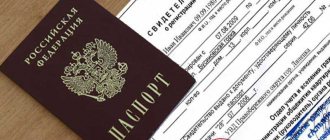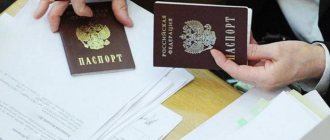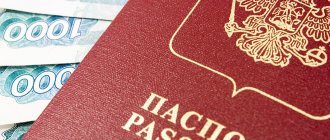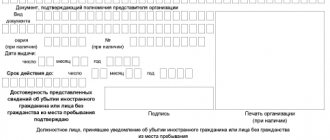Stay of foreign citizens in Russia
The most popular among foreigners is temporary registration, because their permanent place of residence is considered to be in their homeland. Temporary registration at the place of residence is also issued for citizens of the Russian Federation in the event of moving to another city for employment, for example, or for other reasons.
Foreigners need documentary grounds to cross the border of the Russian Federation and confirm the legality of their stay in the country:
- visa;
- passport and migration card (for migrants from countries with a visa-free regime);
- registration stub;
- VHI policy.
All foreigners must have these documents, with the exception of those who come to Russia for a period of less than 7 days. The list of papers that employed migrants need to receive is even wider.
As we can see, the registration form is included in the list of required documents for the legal stay of a foreigner in Russia. So why do you need registration at your place of residence and what does it give? We’ll answer this question further.
Migration registration of foreigners in Russia
By law, a person cannot be deprived of any rights on the basis of lack of registration. However, accompanying by-laws limit access to social benefits (employment, medicine, education) for migrants who do not register for migration in due time. In addition, this is also punishable financially (in the form of fines) and physically (through administrative expulsion).
In accordance with legislative norms, every foreign citizen, like a Russian, is obliged to notify government authorities of his actual place of residence, or, in simple words, to obtain a temporary residence permit.
Registration is carried out for information purposes only. The notification nature of registration is mentioned in almost all regulations, and it does not matter on what grounds (visa or visa-free) and for what purposes (work, study, treatment, business trip, visit to relatives, etc.) the migrant came to the Russian Federation. Federation.
You can register in different ways - from personal visits to government agencies to using online resources.
Help and support
On any page of the site, at the very bottom there is a section called “Help and Support”. Here are answers to various possible questions that arise when working with the site.
Questions are divided into different categories to make it more convenient for visitors to use the resource. Among them:
- Popular.
- Concerning registration and login to a virtual resource.
- About payment.
- About working in your personal account.
It is also convenient to use the search bar where you can enter a question of interest. This can significantly reduce search time.
If difficulties arise when registering foreigners on a virtual resource, you can contact the technical support service by calling the hotline or using the feedback form.
If there is an error checking your passport or SNILS on the government services website, what to do, watch this video:
What is considered a place of residence?
“Place of residence” is considered to be a place that is different from the address of permanent residence. Many foreigners, especially those who come to Russia for the first time, cannot understand: is temporary registration a place of residence or a place of stay and what is their difference? Based on the norms of legislative acts and definitions of terms, we can conclude that the second option is legal.
The laws do not have a definition of “temporary registration”; there is the concept of registration “at the place of stay”. And the phrase “temporary registration” is used from old memory, from Soviet times, because it was in the Soviet Union that the institution of “registration” was approved and actively operated. There was no question whether it was mandatory; law enforcement agencies ensured that every citizen had a “documentary” address.
Modern laws have adopted good practices from the past. They only slightly corrected the terminology and character: they replaced the word “registration” with the word “registration”, and the concept of “permanent” is now assigned to a specific address - “place of residence”, and “temporary” - “place of stay”. Another innovation is the notification nature of registration.
To the question of what benefits such informing government bodies of one’s location gives, the answers are obvious:
- calculation of the load on medical, educational and other government institutions;
- assistance to law enforcement and judicial authorities in finding criminals;
- protection of the rights and freedoms of foreign citizens, as well as monitoring the performance of their duties.
The exact answer to the question: what is temporary registration at the place of stay can be found in legislative acts. With the help of the regulatory documents of the registration institution, as well as the established infrastructure of the bodies responsible for the flow of migrants, the place of residence of foreigners (permanent or temporary), control and development of the state’s migration policy are recorded.
Legislative acts regulating the stay of foreigners in Russia
Federal Law No. 109-FZ of July 18, 2006 “On migration registration of foreign citizens and stateless persons in the Russian Federation” is the main law on temporary registration at the place of stay for guests of the state. An annex has also been developed to it - Decree of the Government of the Russian Federation No. 9 of January 15, 2007 “On the procedure for carrying out migration registration of foreign citizens and stateless persons in the Russian Federation.”
The nuances of the registration process at the place of residence are also regulated by the “Administrative Regulations of the Ministry of Internal Affairs of the Russian Federation for the provision of state services for the implementation of migration registration of foreign citizens and stateless persons in the Russian Federation” (approved by Order of the Ministry of Internal Affairs of November 23, 2021 No. 881).
In addition, the provisions on registration of citizens at the place of residence and at the place of stay of foreigners, including certain issues of their registration for migration, are supplemented by the Housing and Administrative Codes of the Russian Federation, Federal Law of July 25, 2002 No. 115-FZ “On the Legal Status of Foreign Citizens” in the Russian Federation" and other legislative acts regulating the state's migration policy.
What establishments are considered hotels?
This term, according to Government Decree No. 1085, includes establishments that provide hotel services and have the appropriate classification, that is, “star rating”.
Based on the above, hotels include:
- hotels directly;
- tourist centers and recreation centers, sanatoriums, boarding houses, holiday homes and similar organizations;
- motels and hostels;
- apartments, aqua-hotels, private guest cottages;
- hunter's and fisherman's houses, bungalows, villas.
In any of these facilities, the settlement of a foreign client automatically entails registration in compliance with legally established rules.
Registration at the place of stay: procedure
Taking into account the requirements of all the previously mentioned laws is quite labor-intensive work even for Russian citizens who are native speakers, let alone foreign ones, and therefore for most of them it is important to know how to make temporary registration at the place of residence.
The essence of the procedure is to notify local authorities of the Main Directorate for Migration and Migration of arrival at a certain place. The basis for registration is notification of arrival, which is transmitted to the responsible authority. Completion of the procedure is confirmed by the detachable part of this notice, which must be in the hands of the foreigner when checking documents by law enforcement agencies. But in most cases, the temporary registration of a foreign guest is handled by the receiving party.
Next, we will consider in more detail the procedure for registering foreign citizens:
- a person’s arrival at the place of stay;
- transfer of the passport and notification form to the receiving party;
- filling out the notification form and submitting it along with a package of documents to the authorities that are involved in registering citizens for migration in a certain territory;
- receiving the detachable part of the notification and handing over all documents to the migrant.
Individuals and legal entities acting as the receiving party should not forget about the deadlines, since it is necessary to register a foreigner at the place of stay within 1 week from the date of arrival of the migrant (with some exceptions)
A package of papers for registration at the place of stay
To obtain a temporary residence permit, you will need documents from the foreigner and the receiving party.
A foreign citizen must attach to his passport (identity card):
- migration card (original and copy);
- arrival notification form;
- visa (if visa exchange is established between countries).
The contents of the package of documents provided by the receiving party depends on who plays this role - an individual or an organization.
Thus, a legal entity must prepare:
- representative of the employer company - copies of constituent documents and papers;
- administration of hotels, sanatoriums, etc. – application for temporary registration at the place of residence.
Individuals who receive foreign guests provide:
- passport (original and copy);
- papers confirming the ownership of housing.
Which authorities deal with migration registration?
When solving the problem of choice, that is, choosing where to register at the place of residence, foreign citizens can contact several authorities:
- territorial branch of the Main Directorate for Migration Issues of the Ministry of Internal Affairs of the Russian Federation (GUVM MIA RF);
- Multifunctional Center;
- online portal for the provision of public services to the population;
- post office (send notification by mail).
The main registration authority at the place of residence is the Main Department of Migration Affairs of the Ministry of Internal Affairs. It is this department that deals with migration registration of foreigners. Employees check the provided data, enter it into the system and issue documents confirming the fact of registration to migrants. You can contact the migration authority in person, or you can send a notification remotely using the services of the Russian Post.
The main negative point that distinguishes registration at the place of stay at the Main Department of Migration Affairs of the Ministry of Internal Affairs (FMS) is the significant workload of the departments and constant queues. To avoid this, foreign citizens and their hosts contact the MFC or resort to the online method - the State Services portal.
Multifunctional Center
Multifunctional centers operate today in almost all major cities. They operate on the “single window” principle. Citizens are received by online appointment or in an electronic queue, which eliminates the problem of queues and the risk of getting to the wrong employee.
Otherwise, registration of a foreign citizen is carried out in the same way as in the department of the Main Department of Migration Affairs of the Ministry of Internal Affairs.
State Services Portal
To register temporarily online, you must:
- go to the State Services Internet portal;
- select and click “Get service”;
- in the form, fill in all the fields required in a particular situation;
- attach scanned copies of documents of the migrant and the receiving party;
- submit the form.
.
Cost of the procedure
Unlike Russian citizens, foreign citizens will have to pay a fee to register for migration. The state fee is 350 rubles. When applying in person to the MFC or migration authority, the interested person pays the state fee at a banking institution, most often at Sberbank; in the case of migration registration through the State Services portal, the money for the service is debited from the bank card.
in a separate mater
Which country would you rather live in? ⚡ Take the test in 2 minutes
Creating a verified account
A verified account is needed so that a citizen can use a legally significant service and resolve his issue. To create it, you need to register by phone number or email. At the initial stage, a person receives a simplified account.
When switching to the standard account level, you must enter additional data, which will then undergo automatic verification by the Russian Ministry of Internal Affairs. After checking and verifying your personal information, you will receive a notification by email or phone that the process has been completed successfully and the account has acquired standard status.
For temporary registration, a foreigner will need to confirm his identity. The system will offer to do this in three ways:
- at the public service center;
- sending a personal code via Russian Post;
- electronic record or card.
To temporarily register a foreign migrant at his place of residence through State Services, the applicant must submit the following papers:
- application in electronic form (filled out directly on the website);
- a scanned copy of a document that confirms the legality of being in Russia;
- guest passport;
- entry pass;
- statistical sheet if the migrant will be registered for 9 months or more;
- a scanned copy of the owner’s permission for temporary registration in his home;
- copy of the lease agreement.
After uploading scanned copies to the State Services portal, the migrant will need to submit the originals of the same documents to the MIA Administration. After completing the registration procedure, you must appear at the authority again and receive a registration certificate.
Registration of foreigners: what are the risks for homeowners
The main concerns of Russians who act as hosts boil down to the following:
- the migrant’s refusal to leave the premises;
- housing claims;
- bringing the living space into an inappropriate condition (damage to property, theft, etc.).
In this regard, homeowners should know the following. Temporary registration gives a foreigner the right to live in a given premises, but on its basis he has much fewer rights than in the case of permanent registration.
Firstly, Russian laws strongly protect property rights, so the mere fact of temporary registration is not enough for any property claims.
Secondly, the rules for temporary registration at the place of stay imply clear mutual agreement on the duration of a person’s residence at a given address. And when the deadlines expire, the registration is considered invalid. Therefore, law enforcement may be involved if the migrant refuses to leave the premises. In an “emergency” situation for the homeowner, migrants can be evicted earlier – by court decision.
The receiving party and its responsibilities
As already mentioned, registration at the place of residence of a foreign citizen is the hassle of the receiving party.
The receiving party may be:
- Russians who have a permanent residence permit at the foreigner’s registration address or are the owners of the premises;
- foreigners permanently residing in Russia (with a residence permit) and having permanent registration;
- the foreign citizen himself, if the residential premises where the registration is carried out is his property. Registration of family members at this address is possible only if the foreigner has the status of a HQS (highly qualified specialist);
- legal entity (Russian or international company, its branch or representative office);
- government bodies of the Russian Federation.
The main responsibilities of the receiving party in registering a foreigner for migration include:
- filling out the arrival notification form (information is taken from the documents provided by the migrant);
- transfer of the completed form to the migration authorities by any of the available methods;
- After checking the correctness of filling out the form by government officials, hand over a tear-off notification slip with a mark to the migrant.
Let's say a little more about the features of filling out the notification form.
Filling out the notification form and submitting it to the Main Migration Department of the Ministry of Internal Affairs
The basic rules for filling out the arrival form include:
- Russian language;
- no errors, corrections or abbreviations;
- filling in all the fields necessary for a specific situation;
- a separate form is filled out for each migrant;
- Attached is a complete package of documents proving the identity of both parties.
The arrival notification form can be downloaded here.
If you have any doubts about filling it out, you can use the sample.
Responsibility and fines for violation of migration legislation.
Responsibility is established by Art.
18.8 of the Code of Administrative Offenses of the Russian Federation and is the same for all foreign citizens and receiving parties. It is worth remembering that for a fake tear-off coupon (false registration), liability is possible not only administratively (for lack of registration), but also criminally (for using deliberately forged documents). The fine for lack of registration ranges from 2000-5000 rubles, and if the protocol is drawn up again, up to 5 years of expulsion from Russia. Since 2013, if the period of stay is overdue by more than 30 days, then entry into the Russian Federation is denied for 3 years. pay attention!!!
Features of registration of Ukrainian citizens for migration
Registration of a Ukrainian at the place of stay in Russia is not much different from the same procedure for those arriving from other countries, however, there are nuances.
For citizens of Ukraine who are forced to stay in the Russian Federation due to an unfavorable situation at home, the period of temporary stay can be extended to 180 days.
Next, you have to decide on your further legal residence in the Russian Federation: obtain a temporary residence permit, residence permit, and find a job. By the way, for Ukrainian citizens working in Russia, temporary registration is possible on the basis of an employment contract (for the duration of the document, but not more than a year).
In addition to official employment, grounds for extending the period of migration registration may be filing an application for a temporary residence permit, recognition as a native speaker of the Russian language, or a petition from the employer of a highly qualified worker, etc.
In such situations, registration at the place of residence of a citizen of Ukraine takes place according to a standard algorithm.
Benefits of using our company
Our specialists ensure prompt communication with the client and confidentiality.
The user will not have to spend time in long queues and worry about whether he will be deceived. When registering for an apartment, payment for services is made after receiving the documents. We can easily provide temporary registration in Moscow for citizens of Ukraine directly from the owner in order to protect the client from scammers.
In addition, we can provide registration under a temporary residence permit for citizens of Ukraine (we are talking about a temporary residence permit that allows you to live and work in the Russian Federation for up to 3 years). Options for registration under a residence permit for citizens of Ukraine are also being considered (a residence permit document allows a foreigner to move freely throughout the Russian Federation for 5 years).
Migration registration of children
Foreigners who move with children have specific questions. Do I need additional documents and visits to the migration authorities? Are there any features of the process depending on the age of the child?
Migrants who are interested in how to obtain a temporary residence permit for a child do not need any additional paperwork or visits to any departments. The procedure for registering young foreigners for migration is the same as for adults. The terms are no different - 7 days from the date of arrival.
Advantages of obtaining BC and RM through the State Services portal
The rapid development of information technology and the computerization of databases of state and municipal bodies provide more and more opportunities to obtain certain government services via the Internet. The presence of official web resources in almost every government agency, as well as the creation of a Unified Government Services Portal, allows each person to significantly simplify the procedures for processing certain documents, including registration with the departments of the Main Department of Migration Affairs of the Ministry of Internal Affairs.
Online registration has the following advantages:
- Filling out applications and questionnaires at home, using the tips provided on the website.
- The ability to correct technical errors, which is unacceptable when filling out forms manually.
- Reducing the waiting time for results due to the absence of the need for repeated personal visits to the departments of the Ministry of Internal Affairs.
- Absence of bureaucratic delays that arise when authorized employees request additional documents (an exhaustive list of requirements is indicated on the public services portal).
The services of the Unified Portal have currently been used by a large number of Russian citizens and foreigners who have appreciated the positive aspects of online submission of applications for receiving, in addition to RMP and RMZh, various types of government services.
Temporary registration in the capital
Those who are not too knowledgeable about how to register at their place of stay in Moscow should not worry too much: for guests of the capital, the same rules for registering for migration apply as for those arriving in other regions of Russia, for example, to the north or south the edges.
As in other cities, migrants should always carry a tear-off arrival notification coupon confirming the fact of registration, since document checks are carried out much more often in the capital.
Nuances of organizing a hotel business
Compliance with the rules for registering foreigners in a hotel/hostel specified in the article will allow you to avoid mistakes when managing your own business. The hotel business is an interesting and promising business option. However, this is a highly competitive field.
If you have not previously worked in this niche, it will be quite difficult for you to open a hotel on your own and build business processes in such a way as to be ahead of competitors and make a profit. Building your own hotel business may take years, while buying a hotel or investing in a mini-hotel will require much lower costs and allow you to quickly gain a foothold in the market.
Grounds for refusal of registration
Reasons why registration can be a problem:
- insufficient living space, large number of registered;
- incomplete package of documents, lack of identity card of the migrant or the receiving party;
- incorrect completion of the arrival notice or migration card;
- illegal border crossing and entry into the territory of the Russian Federation.
In such cases, registration of migrants at their place of stay is not carried out. The behavior strategy of a foreign citizen depends on the reason for the refusal: he needs to look for another premises, bring the missing papers, fill out the notification correctly, and in case of violation of migration rules he will have to answer according to the requirements of the law.
Extension of temporary registration: situations and grounds
Russian legislation has also developed a procedure for extending the temporary registration of foreigners. To do this, there must be documented reasons and a request from the receiving party.
Thus, re-registration at the place of residence is possible if a foreign citizen:
- officially employed;
- submitted an application for a temporary residence permit;
- recognized as a native speaker of Russian;
- studies in Russian educational institutions;
- recognized as a refugee, etc.
About the timing of temporary registration
Summarizing information about how long it takes to register at the place of stay and in what time frame it must be completed, we want to emphasize the following:
- within 7 working days you need to register for migration - the rule is relevant for migrants from almost all countries of the world, there is an exception for guests from the EAEU countries (1 month is allotted for the procedure) and Tajikistan (15 days);
- 3 days for documents to be reviewed by government agencies (7 days in case of extension);
- 90 days is the maximum period for which temporary registration can be issued;
- 1 year – it can be extended for this period upon provision of an employment contract with the employer.
Fictitious registration: consequences
Fictitious registration as “attachment” to a place where the foreigner does not intend to reside is a fairly common occurrence. The main motive for visitors to apply for a “false” registration is work. And if the registration of HQS (highly qualified specialists) is often the employer’s interest, then the migration registration of “mid-level” migrant workers falls squarely on their shoulders.
“Local” businessmen are not averse to making money from this by providing their living space for such purposes.
Despite the imaginary advantages for both parties, they should remember that such benefits are temporary, and violation of the law moves from the administrative to the criminal level. Accordingly, fines for obtaining a “false” registration can reach several hundred thousand rubles.









